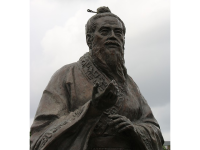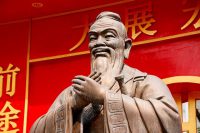駟も舌に…

駟も舌に及ばず(しもしたにおよばず)。 – 『論語』顔淵(がんえん)(中国~日本の諺) / ([(漢)駟不及舌。]) / 言葉は口から出したら最後、取り返しがつかない。 More »

駟も舌に及ばず(しもしたにおよばず)。 – 『論語』顔淵(がんえん)(中国~日本の諺) / ([(漢)駟不及舌。]) / 言葉は口から出したら最後、取り返しがつかない。 More »

温故知新。[故きを温ねて新しきを知る(ふるきをたずねてあたらしきをしる)。/故きを温めて新しきを知る。] – 孔子 (紀元前551? – 前479): 『論語』為政 / これからどうなるか知ろうと思う者は、これまでどうであったかをよく考えねばならない。 More »

(子曰く、)賢を見ては斉しからん(ひとしからん)ことを思ひ(おもい)、不賢を見ては内に自ら省みるなり。 – 孔子 (紀元前551? – 前479): 『論語』里仁(りじん) / ([(漢)子曰、見賢思齊焉、見不賢而内自省也。]) (d BossarteによるPixabayからの画像) (Google Translateのエンジンを使用した、Sound of Textによるテキスト読み上げ) More »

(子曰く、)学びて時にこれを習う、また説ばしからずや(よろこばしからずや)。朋有り(ともあり)遠方より来たる、また楽しからずや。人知らずして慍みず(うらみず)[慍らず(いきどおらず)]、また君子ならずや。 – 孔子 (紀元前551? – 前479): 『論語』学而(がくじ) / ([(漢)学而時習之、不亦説乎。有朋自遠方来、不亦楽乎。人不知而不慍、不亦君子乎。]) (Peggy und Marco Lachmann-AnkeによるPixabayからの画像) (Google Translateのエンジンを使用した、Sound of Textによるテキスト読み上げ) More »

君子は和して同ぜず、小人は同じて和せず。 – 孔子 (紀元前551? – 前479): 『論語』子路(しろ) / ([(漢)君子和而不同、小人同而不和。]) More »
![IMAGE: Learning without thought is labor [labour] lost; thought without learning is perilous.](https://www.ok312.net/wp-content/uploads/2014/12/confucius-547152_640-200x150.jpg)
学びて思わざれば則ち(すなわち)罔し(くらし)、思いて学ばざれば則ち殆し(あやうし)。 – 孔子 (紀元前551? – 前479): 『論語』為政 / ([(漢)学而不思則罔、思而不学則殆。]) / (自由があっても学びが…) More »
![IMAGE: Too much is as bad as too little. / Too much spoils, too little is nothing. [Too much spoils, too little does not satisfy.]](https://www.ok312.net/wp-content/uploads/2015/01/matchstick_fire_drop-of-water_water-drop_640-200x150.jpg)
過ぎたるは猶及ばざるが如し。 – 孔子 (紀元前551? – 前479): 『論語』先進 / ([(漢)過猶不及。]) / 多過ぎても台無し、少な過ぎても用無し。 More »

一を聞いて十を知る。 – 『論語』公冶長(こうやちょう)(中国~日本の諺) / ([(漢)聞一以知十。]) / 賢い人には一言で十分。 More »

過ちては(則ち)改むるに憚ること勿れ(あやまちてはすなわちあらたむるにはばかることなかれ)。 – 孔子 (紀元前551? – 前479): 『論語』学而(がくじ)(中国~日本の諺) / ([(漢)過則勿憚改。]) / 改めるのに遅すぎるということはない。 – チャールズ・リード (1814 – 84): 『改むるに遅すぎることなし』(小説の題名) More »
![IMAGE: That's water under the bridge. [That's water over the dam.] / Let bygones be bygones.](https://www.ok312.net/wp-content/uploads/2015/01/waterfall-100072_640-200x150.jpg)
過ぎたことは水に流せ。 / 既往は咎めず。 – 孔子 (紀元前551? – 前479): 『論語』八佾(はちいつ) / ([(漢)既往不咎。]) More »